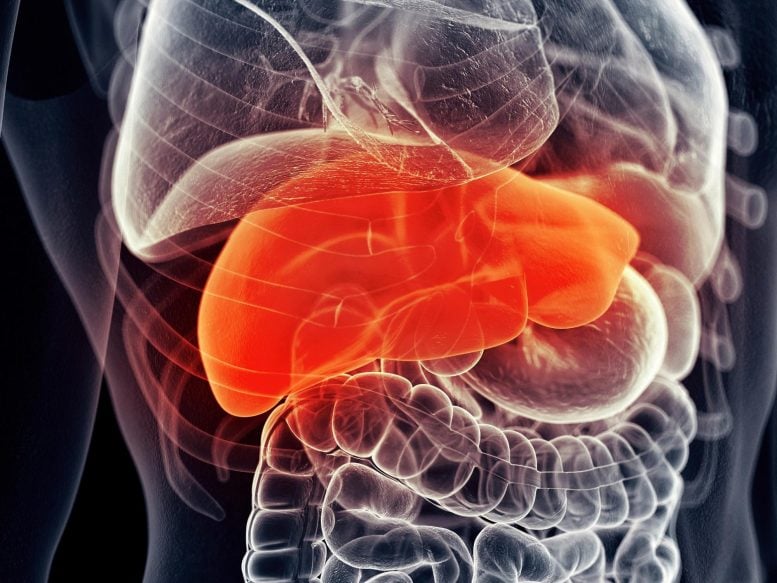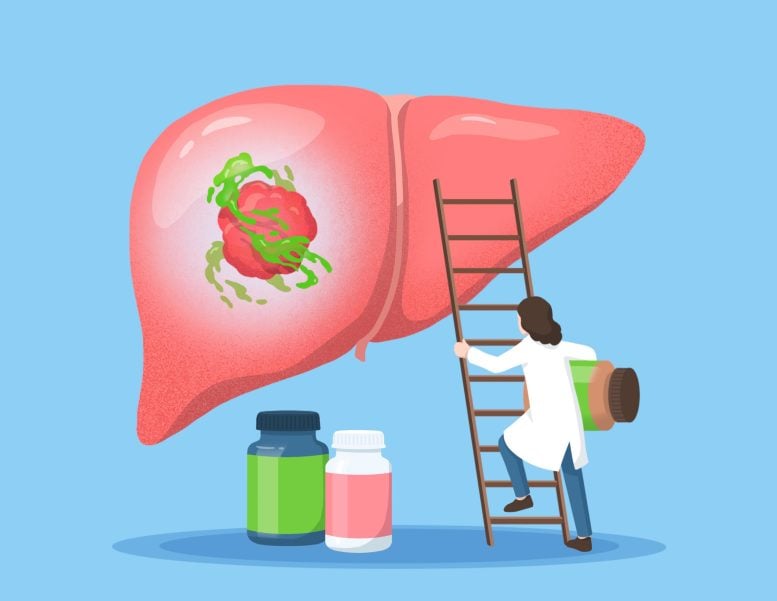 精选
精选
科学家发现易于获得的膳食补充剂可以帮助治疗肝癌
诸平
Fig. 2 From left: Susan Kaech and Siva Karthik Varanasi. Credit: Salk Institute
据美国索尔克生物研究所(Salk Institute for Biological Studies, La Jolla, CA, USA)2025年1月21日提供的消息,科学家发现易于获得的膳食补充剂可以帮助治疗肝癌(Scientists Discover Readily-Available Dietary Supplement Could Help Treat Liver Cancer)。
索尔克生物研究所的科学家发现,消除胆汁酸产生蛋白BAAT(bile acid-producing protein BAAT)并补充胆汁酸——熊去氧胆酸{ursodeoxycholic acid (UDCA)}可以调节肝癌小鼠的肿瘤生长。这一发现表明,熊去氧胆酸(UDCA)膳食补充剂可以提供一种快速有效的方法来改善肝癌患者的预后。
免疫疗法(Immunotherapy)是利用患者的免疫系统瞄准并消灭肿瘤的一种晚期癌症治疗方法。它显著改善了各种癌症的治疗效果,包括肺癌、肾癌和膀胱癌。然而,鉴于肝癌发病率在过去40年中几乎增加了两倍,它对肝癌的疗效明显有限。
为了研究为什么免疫疗法对肝癌效果较差,索尔克生物研究所的研究人员检查了免疫系统和肝脏之间的相互作用。他们对小鼠和人类肝脏肿瘤的研究表明,肝脏中的某些胆汁酸可以影响T细胞的功能,T细胞是负责对抗癌症的免疫细胞。
胆汁酸在肝癌中作用的发现(Discovery of Bile Acids’ Role in Liver Cancer)
研究人员发现了几种与T细胞功能受损和肿瘤生长有关的肝胆汁酸(liver bile acids),并能够通过阻断肿瘤的产生成功地阻止肿瘤的生长和缩小现有的肿瘤。他们还发现一种特定的胆汁酸——熊去氧胆酸(UDCA)对肝脏中的T细胞活性有积极作用。
事实上,通过膳食补充提高胆汁酸的水平足以控制肝癌小鼠的肿瘤生长。由于这些补充剂已经在市场上销售,并用于治疗其他肝脏疾病,研究人员希望UDCA可以纳入肝癌治疗计划,使免疫治疗对这些患者更有效。相关研究结果于2025年1月9日已经在《科学》(Science)杂志网站发表——Siva Karthik Varanasi, Dan Chen, Yingluo Liu, Melissa A. Johnson, Cayla M. Miller, Souradipta Ganguly, Kathryn Lande, Michael A. LaPorta, Filipe Araujo Hoffmann, Thomas H. Mann, Marcos G. Teneche, Eduardo Casillas, Kailash C. Mangalhara, Varsha Mathew, Ming Sun, Isaac J. Jensen, Yagmur Farsakoglu, Timothy Chen, Bianca Parisi, Shaunak Deota, Aaron Havas, Jin Lee, H. Kay Chung, Andrea Schietinger, Satchidananda Panda, April E. Williams, Donna L. Farber, Debanjan Dhar, Peter D. Adams, Gen-Sheng Feng, Gerald S. Shadel, Mark S. Sundrud, Susan M. Kaech. Bile acid synthesis impedes tumor-specific T cell responses during liver cancer. Science, 2025, 387(6730): 192-201. DOI: 10.1126/science.adl4100. Published 9 January 2025. https://www.science.org/doi/10.1126/science.adl4100
参与此项研究的有来自美国拉霍亚的索尔克生物研究所(NOMIS Center for Immunobiology and Microbial Pathogenesis, Salk Institute for Biological Studies, La Jolla, CA, USA)、美国加州大学圣地亚哥分校(School of Medicine, University of California San Diego, La Jolla, CA, USA)、美国拉霍亚的桑福德·伯纳姆·普雷比斯医学发现研究所(Sanford Burnham Prebys Medical Discovery Institute, La Jolla, CA, USA)、美国纽约哥伦比亚大学欧文医学中心(Columbia University Irving Medical Center, New York, NY, USA)、美国纽约的纪念斯隆·凯特琳癌症中心(Memorial Sloan Kettering Cancer Center, New York, NY, USA)、美国纽约的威尔·康奈尔医学科学研究生院(Weill Cornell Graduate School of Medical Sciences, New York, NY, USA)、美国纽约的帕克癌症免疫治疗研究所(Parker Institute for Cancer Immunotherapy, New York, NY, USA)、美国汉诺威的达特茅斯盖泽尔医学院(Geisel School of Medicine at Dartmouth, Hanover, NH, USA)、美国新罕布什尔州黎巴嫩的达特茅斯健康公司(Dartmouth Health, Lebanon, NH, USA)的研究人员。
此文有助于解释为什么免疫细胞在不同的肿瘤环境中表现不同,并为改善肝癌治疗和免疫治疗提供了几个新的分子靶点。
这项研究的资深作者、也是索尔克生物研究所NOMIS免疫生物学和微生物发病机制中心(NOMIS Center for Immunobiology and Microbial Pathogenesis, Salk Institute for Biological Studies, La Jolla, CA, USA)主任 Susan M Kaech教授问道:“器官特异性特性和过程如何影响免疫反应?肝脏有一个特别独特的环境,但我们并不真正了解它是如何影响免疫细胞和癌细胞的。通过研究这些肝脏特异性特征,我们已经确定了几种调节胆汁酸、改善T细胞性能和提高患者预后的潜在方法。”
胆汁酸的复杂作用(The Complex Role of Bile Acids)
肝脏产生100多种不同的胆汁酸,这些胆汁酸通过肠道,在消化过程中发挥重要作用。为了让T细胞对抗肝脏中的癌症,它们必须绕过这些胆汁酸发挥作用。先前的研究表明,过量的胆汁酸可能表明健康状况不佳并加剧癌症,但由于大多数研究未能分离每种胆汁酸的影响,因此它们在癌症中的具体作用仍不清楚。
Susan M Kaech教授实验室的前博士后研究员、现任美国麻省大学陈医学院(University of Massachusetts Chan Medical School)助理教授的西瓦·卡西克·瓦拉纳西(Siva Karthik Varanasi)说:“考虑到T细胞在不同器官、组织和肿瘤中的表现是如何变化的,这让我们在寻找优化癌症治疗的方法方面处于一个非常有利的位置。通过采用这种独特的方法,我们能够看到肝脏中的胆汁酸极大地影响T细胞的工作能力,因此可能是一个有用的治疗靶点。”
为了探索肝脏肿瘤环境的独特特征,索尔克生物研究所团队首先对人类肝癌活检中存在的胆汁酸进行了分类。他们发现肝脏肿瘤样本中共轭胆汁酸(conjugated bile acids)的水平升高,然后询问这类胆汁酸是否直接导致了癌症的发展。在去除产生共轭胆汁酸的BAAT蛋白后,他们发现小鼠的肿瘤负担减轻了,这是一个强有力的指标,表明调节肝癌患者的BAAT水平可能会改善他们对免疫治疗的反应。
胆汁酸{bile acids (BAs)}是胆汁的主要成分,根据其化学结构可分为游离胆汁酸(free bile acids)和共轭胆汁酸(conjugated bile acids)。游离胆汁酸包括胆汁酸{cholic acid (CA)}、去氧胆酸{ deoxycholic acid (DCA)}、鹅去氧胆酸{chenodeoxycholic acid (CDCA)}和石胆酸{lithocholic acid (LCA)}。共轭胆汁酸(Conjugated bile acids)包括糖胆酸{glycocholic acid (GCA)}、牛磺胆酸{taurocholic acids (TCA)}、糖鹅脱氧胆酸{glycochenodeoxycholic acid (GCDCA)}和牛磺熊去氧胆酸{Tauroursodeoxycholic Acid (TUDCA)} [1]。
接下来,他们分离出20种不同的胆汁酸,观察它们对T细胞健康的影响。除了一种叫做牛磺熊去氧胆酸(TCDCA)的胆汁酸外,原胆汁酸几乎没有什么作用,TCDCA会引起氧化应激——一种分子失衡,导致细胞和组织损伤。次级胆汁酸的影响更大,其中两种表现出特别显著的作用:石胆酸 (LCA)和熊去氧胆酸{Ursodeoxycholic Acid (UDCA)}。
潜在的临床应用(Potential Clinical Applications)
石胆酸(LCA)通过引起内质网应激(endoplasmic reticulum stress)损害T细胞功能,其中细胞不能再正确折叠和修饰蛋白质。熊去氧胆酸(UDCA)改善T细胞功能,促进免疫细胞向肝脏募集。膳食补充UDCA足以控制肝癌小鼠的肿瘤生长,为提高肝癌患者的免疫治疗效果提供了一种容易转化的方法。
这些发现可能会塑造肝癌治疗的未来,表明减少BAAT和增加UDCA可以控制肿瘤生长,提高T细胞和免疫治疗的疗效。
“在将我们的发现转化为临床应用方面,我们已经向前迈出了一大步,因为UDCA补充剂已经用于治疗肝脏疾病,下一步可以很容易地在肝癌中进行测试,”同时担任索尔克生物研究所NOMIS主席(NOMIS Chair at Salk)的Susan M Kaech说。“我们也很高兴能探索肠道微生物群在这一切中的作用,因为胆汁酸是这幅图的重要组成部分。我们如何操纵微生物群中的好细菌和坏细菌来进一步调节胆汁酸水平?肝癌期间微生物群是如何变化的?益生菌能成为一种治疗方法吗?都是需要研究的问题。”
除了探索可以帮助治疗肝癌的饮食和微生物组操作外,研究小组还好奇地想知道是否可以通过靶向BAAT治疗其他疾病。他们已经相信,慢性肝病和肥胖症可能从减少共轭胆汁酸中受益。
这项工作得到了美国国立卫生研究院{National Institutes of Health (NCI CCSG: P30 014195, S10-OD023689, P30 AG068635, P30 CA014195, P01 AG073084, R01 CA240909-04, R21 AI151562, F31CA278581, CCSG Grant P30CA23100, R01DK137061, R01DK133930, DK120515, R01AI143821, R01AI164772, U01AI163063)}、Waitt基金会(Waitt Foundation)、Helmsley慈善信托基金(Helmsley Charitable Trust)、Chapman基金会(Chapman Foundation)、癌症研究所(Cancer Research Institute)、美国国家癌症中心(National Cancer Center)、NOMIS基金会(NOMIS Foundation)、Salkexcellerators奖学金(Salkexcellerators Fellowship)、达蒙·鲁尼恩奖学金(Damon Runyon Fellowship)、奥黛丽·盖泽尔生物医学科学教授(Audrey Geisel endowed Chair of Biomedical Science)、奥特曼临床转化研究所{Altman Clinical Translational Research Institute (KL2TR001444)}、圣地亚哥消化疾病研究中心(San Diego Digestive Diseases Research Center)和达特茅斯癌症中心(Dartmouth Cancer Center)的资助或支持。
上述介绍,仅供参考。欲了解更多信息,敬请注意浏览原文或者相关报道。
The tumor microenvironment (TME) influences cancer growth, proliferation, and response to therapy. Varanasi et al. investigated whether organ-specific metabolites in the TME affect tumor progression and antitumor immune responses in liver cancer (see the Perspective by Goessling). Bile acids are produced in the liver and are required for the digestion and absorption of lipids. Analysis of the enzymes involved in bile acid synthesis revealed elevated levels of the bile acid–conjugating enzyme BAAT (bile acid-CoA:amino acid N-acyltransferase) in patients with hepatocellular carcinoma. Using experimental models of liver cancer, deletion of BAAT improved the antitumor immune responses. Primary bile acids could accumulate in T cells and induce DNA damage, whereas certain secondary bile acids impaired T cell function. Dietary supplementation with ursodeoxycholic acid (ursodiol) boosted T cell function and enhanced immunosurveillance. —Priscilla N. Kelly
The metabolic landscape of cancer greatly influences antitumor immunity, yet it remains unclear how organ-specific metabolites in the tumor microenvironment influence immunosurveillance. We found that accumulation of primary conjugated and secondary bile acids (BAs) are metabolic features of human hepatocellular carcinoma and experimental liver cancer models. Inhibiting conjugated BA synthesis in hepatocytes through deletion of the BA-conjugating enzyme bile acid–CoA:amino acid N-acyltransferase (BAAT) enhanced tumor-specific T cell responses, reduced tumor growth, and sensitized tumors to anti–programmed cell death protein 1 (anti–PD-1) immunotherapy. Furthermore, different BAs regulated CD8+ T cells differently; primary BAs induced oxidative stress, whereas the secondary BA lithocholic acid inhibited T cell function through endoplasmic reticulum stress, which was countered by ursodeoxycholic acid. We demonstrate that modifying BA synthesis or dietary intake of ursodeoxycholic acid could improve tumor immunotherapy in liver cancer model systems.
转载本文请联系原作者获取授权,同时请注明本文来自诸平科学网博客。
链接地址:https://wap.sciencenet.cn/blog-212210-1469932.html?mobile=1
收藏




